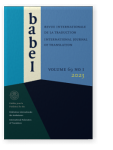Vol. 69:1 (2023) ► pp.76–98
A deficient presence
Translating Old Master Q Chinese Idioms LOL for edutainment
The collaboration between the visual and textual narrative in comics, richly loaded with cultural codes and background, leads to challenges in translation. Cultural transference in comics is inevitably obstructed and distorted. Even readers who understand both the source and target language may need help comprehending the entire narrative, not to mention monolingual readers. In an international city like Hong Kong, where cultures coexist independently yet interrelatedly, the incomprehensiveness of the translated version of Old Master Q Chinese Idioms LOL (2012) is instantly recognized by bilingual Chinese-English readers. A problematic transposition of semiotic and cultural knowledge and a disrupted interplay between the textual and visual narratives causes incomprehension. The translation of this comic series becomes even more challenging to achieve the clear intent of edutainment. This article will argue that translated comics will appear deficient to monolingual and bilingual readers even if they are equipped with the semiotic knowledge of the source and target language. The translation of multimodal texts is considerably constrained by a chain effect triggered by posting changes to any element in comics – a syncretic semiotic environment.
Article outline
- 1.Introduction
- 2.What is edutainment?
- 3.Translating cultural codes in the image-text narration
- 4.Translating “edutainment” in Old Master Q Chinese Idioms LOL
- 5.Conclusion
- Notes
-
References
